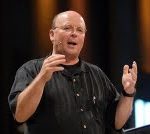McKnight, Scot. Fasting. Thomas Nelson, 2009. ISBN: 978-0-8499-0108-9.
Scot McKnight is an Anabaptist theologian and a professor of religious studies at Northpark University. The author of over 20 books, including The Jesus Creed, he specializes in Jesus studies and the New Testament. As an authority in Jesus studies, McKnight has been frequently consulted by Fox News, WGN, US News & World Report, Newsweek, TIME, as well as newspapers throughout the United States. Visit his blog to read a more complete bio or read some of his many posts or how to connect with him on Facebook or follow him on Twitter.
Book Basics
This book should begin with a warning or disclaimer: Any disciple of Jesus who reads this book will be challenged to incorporate fasting into her or his journey of faith. I suspect many readers will be surprised to learn that fasting is not only a spiritual discipline but one that was widely practiced from the earliest days of the Christian faith until rather recently.
McKnight defines fasting as “the natural, inevitable response of a person to a grievous sacred moment in life” (p. xx). He crafts a formula based on that definition and returns to it often: A –> B –> C. Fasting begins with A (grievous sacred moment), which generates B (a response of fasting). Only then can the experience generate C (anything the person might term results). Put in another way, we come to the spiritual discipline of fasting always because of a grievous sacred moment. This understanding is a needed corrective to the instrumental approach, which wrongly suggests that we fast in order to receive something.
So What?
“Nearly everyone who fasts realizes in one way or another that fasting makes us deeply aware that food sustains us, and this realization leads us to be grateful to God for our food. Gratitude leads one to perceive that we are dependent upon God, and when we can achieve this realization we can make genuine moral progress in life” (p.153-4).
“Perhaps what we need to become deeper in fasting is bigger eyes and bigger hearts. What we need is greater sensitivity to the plight of others and the grievousness of life’s sacred moments” (p.168).
Do you fast? If so, what have you learned as a result of engaging in this spiritual discipline? If not, what are your reasons for remaining on the sidelines? (Note: health conditions or concerns are a legitimate reason to be on the sidelines.)
